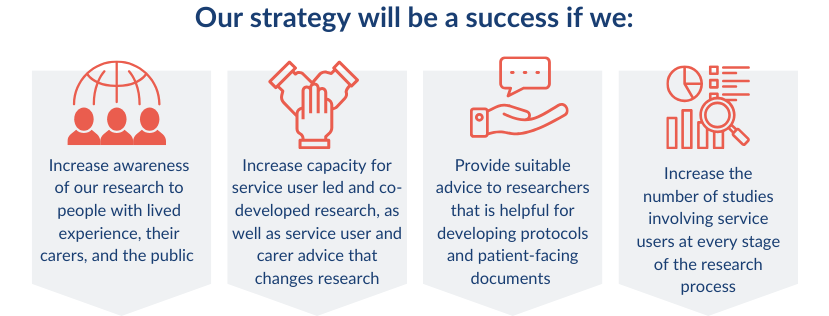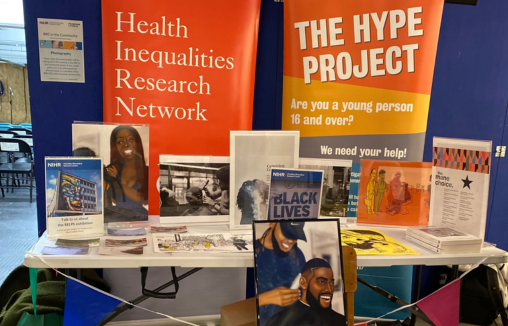Our strategy connects people, patients, and carers with our research in a meaningful and inclusive way, so that opportunities to become involved in research at every level are visible to the public, especially mental health service users.
Download a PDF version of the full strategy here
Download a one-page summary of the strategy here

- Increase awareness of our research to people with lived experience, their carers, and the public
- Increase capacity for service user led and co-developed research, as well as service user and carer advice that changes research
- Provide suitable advice to researchers that is helpful for developing protocols and patient-facing documents
- Increase the number of studies involving service users at every stage of the research process
Purpose, aims and objectives
The National Institute for Health and Care Research (NIHR) Maudsley Biomedical Research Centre (BRC) hosted at South London and Maudsley NHS Foundation Trust in partnership with King’s College London develops and supports infrastructure to improve research in mental health and neurological conditions.
Our Patient and Public Involvement and Engagement (PPIE) strategy connects people, patients, and carers with our research in a meaningful and inclusive way, so that opportunities to become involved in research at every level are visible to the public, especially mental health service users.
We involve service users in our research at all stages since their experience is an essential and valuable source of knowledge, and a necessary part of high-quality research. This means service users are involved in:
- setting research agendas,
- overseeing projects and programmes,
- and disseminating research.
This includes supporting research by expert researchers with experience of using mental health services (service user researchers).
We aim to ensure that our research is relevant to stakeholders, including patients, their supporters, and clinical staff. Patients are embedded into the management and governance of our work. We also strive to be an example to other researchers and clinicians to demonstrate what it is possible to achieve as well as the benefits that PPIE brings to research and clinical practice.
Our strategy follows from our previous work developed from our earliest BRC, building trust, influence, and representation amongst patients and public.
We will
- continue to develop links to local community groups e.g., the Dragon Café, Pint of Science, and continue our partnerships in the UK (e.g. The McPin Foundation) and USA (OneMind Psyberguide),
- work with other BRCs to support PPIE as well as to carry out research with a strong PPIE component,
- continue to support service user and carer advisory groups that can offer lived experience views to be incorporated into research programmes,
- continue to develop novel user-led research methods such as multi-criterion modelling that will bring the user voice into research,
- develop expert user involvement in the research themes.
These types of involvement will be embedded throughout the BRC.
We continue to engage with all UK Standards for Public Involvement (Faulkner, 2015).
We offer inclusive opportunities to participate in our openly advertised research and advisory groups. We involve service users early in research via five advisory groups.
We promote and support learning opportunities and confidence in collaboration through our co-produced research skills training for service users, carers, and NHS staff within the South London and Maudsley (SLaM) Recovery College to overcome barriers of confidence and understanding so they can participate in our work. We also provide opportunities for those with lived experience to undertake PhDs to increase the capacity of our workforce to support PPIE.
Our Strategy will be a success if we:
- increase awareness of our research to people with lived experience, their carers, and the public by tracking the hits to our BRC website and working towards expanding this number, increasing C4C use by researchers and producing six media articles each year covering our BRC research outputs.
- increase capacity for service user led and co-developed research as well as service user and carer advice that changes research. This will be achieved by developing research theme and research project specific expertise through steering and advisory committees and PhDs undertaken by people with lived experience,
- provide suitable advice to researchers that is helpful for developing protocols and patient-facing documents, with acknowledgements of this advice in peer reviewed research publications
- increase the number of studies involving service users at every stage of the research process including having service users as authors of the final publication and doubling the number of those publications each year.
We have a commitment to plain language and try to be jargon free. If you find something in this document which you find hard to understand, please let us know.
Our PPIE is flexible to external demands and takes advantage of opportunities in the research field that people with lived experience feel strongly about. For instance, in the last BRC we carried out studies on views of ketamine with the NIHR Oxford BRC in order to support mechanisms of introduction of the drug into the NHS. We will continue to take advantage of these opportunities as they arise but have also produced milestones for our success indicators in order to track our progress (see Table 1 at the end of this page).

This strategy outlines how we approach service user and public involvement.
We want to involve people in shaping the direction of our research and the infrastructure we need to develop.
For the purposes of this document, we use the following definition of public involvement in research will be used, which is, “research being carried out with or by members of the public rather than to, about or for them.”
We believe that sometimes engagement can lead into involvement, since people often need to be aware of research before becoming involved.
Our strategy is informed by discussions with other BRCs and the National Institute for Health and Care Research (NIHR). We have consulted with academics and clinicians within our BRC, and importantly our service users and carers/supporters who have been involved with the BRC through our advisory groups.
Our external collaborations include other universities, UK and international charities (e.g., The McPin Foundation, OneMind Psyberguide) as well as locally for engagement and dissemination (e.g., Dragon Café, Black Thrive Lambeth).
In 2019/2020, before our application for the current BRC, we held five workshops with academics, service users and carers/supporters so we could get their understanding and priorities for research. In addition to a general meeting between the Service User Advisory Group ( SUAG) and the BRC Director we wanted to ensure that they could influence the future direction of research in our BRC through setting priorities.
These workshops focussed on scientific topics (Digital Therapeutics, Prevention, Improving clinical trials, Clinical Neuroscience/Sleep, Transdiagnostic measurement for precision psychiatry) as well as the overarching mission of this BRC. In addition to questions and discussion with service user members we also included at every workshop a section for service user members to comment on the potential work described and whether some of it was a priority for them. There were occasions when these comments affected our prioritisation. The whole of this work guided the funding application for this round of the Maudsley BRC. We have evidence that service users influence BRC research (e.g., Adanijo, et al.,2021; Jilka et al., 2021; Robotham et al., 2016).
We have written this document with reference to the ‘4Pi’ framework, adhering to the Principles, Purpose, Presence, Process, and Impact (National Survivor User Network; Faulkner, 2015) of involvement activity on our BRC and have highlighted where our activities adhere to this framework. We are further supported by our Public Engagement Champion, Professor Sally Marlow an experienced broadcaster, and our ED&I Champion, Dr Mariana Pinto da Costa.
Programme of Activities and Research
Service User and Public Participation is one of three central themes of our BRC. Our theme provides input into the BRC in seven main ways, which you can explore below.
Our research and our reflection and evaluation activities are conducted by people with lived experience of mental health problems and our reflections are also led by service user researchers
The Future

In addition to monitoring the effectiveness of service user involvement in governance we will also ensure that all BRC projects keep PPIE in mind when identifying research questions/topics and designing and implementing projects.
We have already been successful in increased user led and co-led studies but in this BRC this will be extended not only by facilitating service user-led research and increasing capacity through new user led PhD projects, but also providing more role models and developing infrastructure to increase recruitment, involvement, and engagement with research amongst service users, carers, clinicians, and the public.
This process will include encouraging our research themes to build more service user involvement into projects as well as building descriptions of that involvement into their papers and measuring the extent of that involvement especially assessing service user advisors as authors.

Adanijo A, McWilliams C, Wykes T, Jilka S. Investigating Mental Health Service User Opinions on Clinical Data Sharing: Qualitative Focus Group Study. JMIR Ment Health 2021;8(9):e30596 DOI: 10.2196/30596
Evans, J, Papoulias, C. Between funder requirements and 'jobbing scientists': The evolution of patient and public involvement in a mental health biomedical research centre - A qualitative study. Research Involvement and Engagement. 2020, 6(1) DOI: 10.1186/s40900-020-00185-7
Faulkner et al., 4Pi National Standards. 2015.
Hudson G, Negbenose E, Neary M, Jansli SM, Schueller S M, Wykes, T, & Jilka, S. (2022) Comparing Professional and Consumer Ratings of Mental Health Apps: Mixed Methods Study. JMIR Formative Research, 6(9), e39813. https://doi.org/10.2196/39813
Jilka S, Hudson G, Jansli S, Negbenose E, Wilson E, Odoi, C., . . . Wykes T. (2021) How to make study documents clear and relevant: The impact of patient involvement. BJPsych Open, 7(6), E202. doi:10.1192/bjo.2021.1040
McCrone P, Mosweu, I, Yi D, Ruffell T, Dalton B, Wykes T. Patient Preferences for Antipsychotic Drug Side Effects: A Discrete Choice Experiment. Schiz Bull Open, Volume 2, Issue 1, January 2021. https://doi.org/10.1093/schizbullopen/sgab046
Robotham D, Wykes T, Rose D, Doughty L, Strange S, Neale J, Hotopf M. Service user and carer priorities in a Biomedical Research Centre for mental health. J Ment Health. 2016 Jun;25(3):185-8. doi: 10.3109/09638237.2016.1167862.

Short term (1-2 years)
Increase knowledge
- Update strategy and review governance documents
- Develop and implement the guide to clinical studies in South London and Maudsley NHS Foundation Trust with BRC Service User Advisory Group input
- Public research information - two studies in in the media plus baseline hits to updated website
Increase capacity
- Begin systematic review of PPI facilitators and barriers in mental health research,
- Begin development of the novel method outcome assessment (MCDM)
- Research themes to develop their PPIE plans
- Recruit at least one service user for PhD
Suitable advice
- Measure number of projects to advisory groups
- Feedback from researchers on usefulness
Service users as authors
- Recruit at least one service user PhD student
- Produce guide for lived experience section in a published paper
- Baseline number of service user authors of BRC
Medium term (2 -4 years)
Increase knowledge
- Review PPIE strategy including research theme achievements,
- Measure visits to BRC website and Take Part in Research website hosted by the Trust
Increase capacity
- Publish the systematic review
- Analyse data and publish MCDM outcomes
Suitable advice
- Measure number of projects to advisory groups
- Feedback from researchers on usefulness
Service users as authors
- Measure use of lived experience section in BRC papers
- Measure number of service user authors of BRC papers
Long Term
Increase knowledge
-
Review facilitators and barriers for PPIE models in research themes
-
Report public interactions via media and directly, especially with local groups
Increase capacity
- Completion of at least one service user PhD
- Publish Discrete Choice Experiment involving service users making choices about outcomes,
Suitable advice
- Published papers on the suitability of advice provided and its effects on our research from BRC as a whole and the research themes
Service users as authors
- Increase by 200% from baseline, service user representation on authorship,












